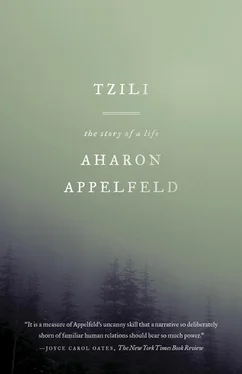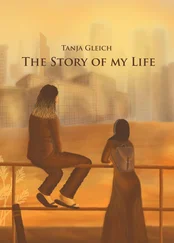“Have you any tobacco?” she asked a peasant woman standing at the doorway of her hut.
“And what will you give me in exchange?”
“I have a coat,” said Tzili and held it up with both hands.
“Where did you steal it?”
“I didn’t steal it. I got it as a present.”
Upon hearing this reply an old crone emerged from the hut and announced in a loud voice: “Leave the whore’s little bastard alone.” But the younger woman, who liked the look of the coat, said: “And what else do you want for it?”
“Bread and sausage.”
Tzili knew how to bargain. And after an exchange of arguments, curses, and accusations, and after the coat had been turned inside out and felt all over, they agreed on two loaves of bread, two joints of meat, and a bundle of tobacco leaves.
“You’ll catch it if the owner comes and demands his coat back. We’ll kill you,” the old crone said threateningly.
Tzili put the bread, meat, and tobacco into her sack and turned to go without saying a word. The old crone showed no signs of satisfaction at the transaction, but the young woman made no attempt to hide her delight in the city coat.
On the way back Tzili sat and paddled in the water. The sun shone and silence rose from the forest. She sat for an hour without moving from her place and in the end she said to herself: Mark is sad because he has no cigarettes. When he has cigarettes he’ll be happy. This thought brought her to her feet and she started to run, taking shortcuts wherever she could.
Toward evening she arrived. Mark bowed his head as if she had brought him news of some great honor, an honor of which he was not unworthy. He took the bundle of tobacco leaves, stroking and sniffing them. Before long he had a cigarette rolled from newspaper. An awkward joy flooded him. In the camp people would fight over a cigarette stub more than over a piece of bread. He spoke of the camp now as if he were about to return to it.
That evening he lit a fire again. They ate and drank herb tea. Mark found a few dry logs and they burned steadily and gave off a pleasant warmth. The wind dropped too, and seemed gentler than before, the shadows it brought from the forest less menacing. Mark was apparently affected by these small changes. Without any warning he suddenly burst into tears.
“What’s wrong?”
“I remembered.”
“What?”
“Everything that’s happened to me in the past year.”
Tzili rose to her feet. She wanted to say something but the words would not come. In the end she said: “I’ll bring you more tobacco.”
“Thank you,” he said. “I sit here eating and smoking and they’re all over there. Who knows where they are by now.” His gray face seemed to grow grayer, a yellow stain spread over his forehead.
“They’ll all come back,” said Tzili, without knowing what she was saying.
These words calmed him immediately. He asked about the way and the village, and how she had obtained the food and the tobacco, and in general what the peasants were saying.
“They don’t say anything,” said Tzili quietly.
“And they didn’t say anything about the Jews?”
“No.”
For a few minutes he sat without moving, wrapped up in himself. His dull, bloodshot eyes slowly closed. And suddenly he dropped to the ground and fell asleep.
EVERY WEEK she went down to the plains to renew their supplies. She was quiet, like a person doing what had to be done without unnecessary words. She would bathe in the river, and when she returned her body gave off a smell of cool water.
She would tell him about her adventures on the plains: a drunken peasant woman had tried to hit her, a peasant had set his dog on her, a passerby had tried to rob her of the clothes she had taken to barter. She spoke simply, as if she were recounting everyday experiences.
And because the weather was fine, and the rains scattered, they would sit for hours by the fire eating, drinking herb tea, listening to the forest and hardly speaking. Mark stopped speaking of the camp and its horrors. He spoke now about the advantages of this high, remote place. And once he said: “The air here is very fresh. Can you feel how fresh it is?” He pronounced the word fresh very distinctly, with a secret happiness. Sometimes he used words that Tzili did not understand.
Once Tzili asked what the words out of this world meant.
“Don’t you understand?”
“No.”
“It’s very simple: out of this world — out of the ordinary, very nice.”
“From God?” she puzzled.
“Not necessarily.”
But it wasn’t always like this. Sometimes a suppressed rage welled up in him. “What happened to you? Why are you so late?” When he saw the supplies, he recovered his spirits. In the end he would ask her pardon. She, for her part, was no longer afraid of him.
Day by day he changed. He would sit for hours looking at the wild flowers growing in all the colors of the rainbow. Sometimes he would pluck a flower and whisper: “How lovely, how modest.” Even the weeds moved him. And once he said, as if talking to himself: “In Jewish families there’s never any time. Everyone’s in a hurry, everyone’s in a panic. What for?” There was a kind of music in his voice, a melancholy music.
The days went by one after the other and nothing happened to arouse their suspicions. On the contrary, the silence deepened. The corn was cut in one field after the other and the fruit was gathered in the orchards, and Mark, for some reason, decided to dig a bunker, in case of trouble. This thought came to him suddenly one afternoon, and he immediately set out to survey the terrain. Straightaway he found a suitable place, next to a little mound covered with a tangle of thorns. In his haversack he had a simple kitchen knife. This domestic article, dull with use, fired the desire for activity in him. He set to work to make a spade. The hard, concentrated work changed his face; he stopped talking, as if he had found a purpose for his transitory life, a purpose in which he drowned himself completely.
Every week Tzili went down to the plains and brought back not only bread and sausages but also vodka, in exchange for the clothes which Mark gave her with an abstracted expression on his face. His outbursts did not cease, but they were only momentary flare-ups, few and far between. Activity, on the whole, made him agreeable.
Once he said to her: “My late father’s love for the German language knew no bounds. He had a special fondness for irregular verbs. He knew them all. And with me he was very strict about the correct pronunciation. The German lessons with my father were like a nightmare. I always got mixed up and in his fanaticism he never overlooked my mistakes. He made me write them down over and over again. My mother knew German well but not perfectly, and my father would lose his temper and correct her in front of other people. A mistake in grammar would drive him out of his mind. In the provinces people are more fanatical about the German language than in the city.”
“What are the provinces?” asked Tzili.
“Don’t you know? Places without gymnasiums, without theaters.” Suddenly he burst out laughing. “If my father knew what the products of his culture were up to now he would say, ‘Impossible, impossible.’ ”
“Why impossible?” said Tzili.
“Because it’s a word he used a lot.”
After many days of slow, stubborn carving, Mark had a spade, a strong spade. The carved instrument brightened his eyes, and he couldn’t stop touching it. He was in good spirits and he told her stories about all the peculiar tutors his father hired to teach him mathematics and Latin. Young Jewish vagabonds, for the most part, who had not completed their university degrees, who ended up by getting some girl, usually not Jewish, into trouble, and had to be sent packing in a hurry. Mark told these stories slowly, imitating his teachers’ gestures and describing their various weaknesses, their fondness for alcohol, and so on. This language was easier for Tzili to understand. Sometimes she would ask him questions and he would reply in detail.
Читать дальше












